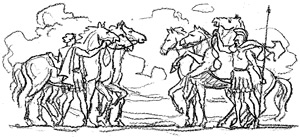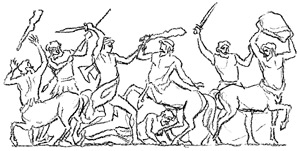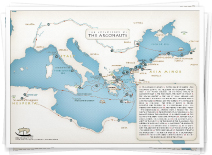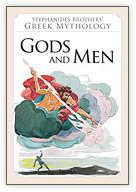
PELOPS AND OENOMAUS
Whoever goes to Olympia today and visits its museum will certainly stand in awe before the statues which once adorned the two pediments of the temple of Zeus. The one which decorated the eastern end shows the chariot race between Pelops and Oenomaus, while the western one depicts the battle between the Centaurs and the Lapiths.
If only because they are portrayed in such great works of art, these two myths deserve to be retold.
But before we begin the myth of Oenomaus and Pelops, we must tell the story of the latter’s father, Tantalus.
In Phrygia, in Asia Minor, beneath the sacred mountain Tmolus, where Midas had once been king, Tantalus, son of Zeus by the oceanid Pluto, was now upon the throne.
Tantalus had all that a ruler could wish for. His ploughlands were fertile and gave bountiful crops. His lush meadows were filled with grazing flocks led by curly-horned rams, while riders on proud horses drove great herds of cattle to other pastures. Every day, rich gifts reached the court of Tantalus, the offerings of chiefs who acknowledged his dominion. And besides all this wealth he had the gold washed down from the mountains by the Pactolus, the richest gold-bearing river in the world.
-1-
As if all this were not enough, Tantalus enjoyed a closer friendship with the gods than any other man on earth. They would often come from Olympus to eat, drink and make merry with him in his golden palaces, and at other times they would invite him to their symposia on Olympus to drink nectar and ambrosia with the gods.
Zeus was so fond of his son that he would even ask him to attend their councils and join with the Olympians in taking those great decisions which determined the fate of mankind.
But the love shown to him by Zeus and the other gods filled Tantalus with such pride that he began to consider himself their superior. Little by little, his respect for them diminished. He began to take nectar and ambrosia from Olympus to toast his friends on earth, and he revealed the secrets of the gods to mortal men to show the world what a splendid fellow he was. Zeus warned him that if he wished to keep his friendship with the Olympians he must be more careful, but Tantalus replied in an insolent and haughty tone:
“I shall do whatever I please. I am a mighty ruler in my own right, and accept advice from no one.”
Zeus frowned his disapproval, but he loved his son so much that he let his pride go unpunished.
The only result of this was an even worse act of impiety on Tantalus’ part: he swore a false oath to the gods, solemnly declaring he had no idea what had become of Laelaps, their beloved golden dog of Crete, whereas the truth was that he not only knew the whereabouts of their favourite animal, but had hidden it himself!
-2-
Until that moment, no god had ever lied on oath, and every mortal who had done so had paid the penalty. Zeus was enraged when he heard what his son had done. Yet once again his fatherly love overcame his harsher feelings and Tantalus went unpunished.
Instead of being grateful for the mercy Zeus had shown him, Tantalus took the gods’ inaction for a sign of weakness. Blinded by his high opinion of himself, he came to believe that the only real proof of power was to commit the most hideous crime imaginable without suffering any of its evil consequences.
Once this sick belief had planted itself in his head, Tantalus began to rack his brain for the cruellest and most horrible act a man could dream of. And, unfortunately, he was not long in finding it: he decided to butcher his own son and serve him up to the gods at a banquet. His aim was not only to humiliate them, but to show the world that the Olympians were not the all-knowing creatures they liked mankind to think them, if they could not even tell what they were eating!
So Tantalus invited the gods to his palace and served them the vilest meal the world had ever known.
But there was no deceiving the immortals: they knew at once what had been set before them and refused to touch the meat. Now, all eyes turned on Zeus. The countenance of the ruler of gods and men had blackened with fearsome rage. Thunder and lightning shook the earth. A crime such as this could never go unpunished and, with a look of loathing, Zeus hurled his son into the dark kingdom of Hades to suffer eternal torture.
-3-
Tantalus was condemned to stand in a pool of crystal-clear water. He was soon afflicted by thirst and wished to drink, but as soon as he leaned forward to do so the water disappeared, leaving only parched, dry earth where it had been. Immediately he returned to an upright position, the water came flooding back waist-high. Again and again Tantalus tried to quench his thirst, but he could not even catch a single drop to wet his cracked and burning lips. He was condemned to the torture of eternal thirst. But this was not all. Over his head hung branches laden with ripe and luscious fruit, and Tantalus was torn by the most terrible pangs of hunger. He stretched up a hand to pluck a fruit and ease the pain which clutched at his entrails, but as he did so the branches rose beyond his grasp. Time and again he reached upwards, but each time he reached in vain. He was condemned to the torture of eternal hunger. And as if these unbearable punishments were not enough, a third was added to them: a huge rock hung teetering above Tantalus’ head, threatening to fall at any moment and crush him beneath its weight. Every time it swayed or creaked, Tantalus was seized with terror. Yet the rock never fell upon him, and so he was condemned to the torture of eternal fear.
When Zeus saw that the miserable king of Phrygia was well punished for his horrible deed, he called Hermes and ordered him to gather up all the pieces of Tantalus’ son from the table, to wash them well and then to fit together once again the young man who had been so cruelly slaughtered. Hermes obeyed his father’s orders with great care and skill, but when he had finished there was a piece still missing from the shoulder. It had been eaten by Demeter, who had lost her daughter, Persephone, and was too upset to realize what was on her plate. However, Hephaestus replaced the missing part with cunningly worked ivory and finally Zeus breathed life into the body. The young man who had been saved was named Pelops, and he would always have an ivory patch on his shoulder. For that reason they still say that anyone who has a white mark on any part of the body is a descendant of his.
-4-
Pelops succeeded to his father’s throne, but he did not rule for long. He was defeated in battle by Ilus, King of Troy, and obliged to flee his kingdom.
With him he took his sister, Niobe, of whom we shall tell in the next book, and as much of his father’s gold as he could carry. Then, together with a few faithful friends, he made his way westwards into Greece.
His wanderings finally brought him to Pisa, a city near Olympia ruled by king Oenomaus.
Oenomaus had a beautiful daughter, Hippodameia, but he did not wish to find a husband for her because the oracle had warned him that he was destined to be killed by the man she married. To forestall this fate, Oenomaus decided to kill every man who asked him for her hand, and he warned all prospective suitors that he would only give away his daughter if one of them could beat him in a chariot race. Whoever lost would die on the end of Oenomaus’ lance.
The contest was one-sided: the king was always as sure of victory as his opponents were of death, for his horses were swifter than the wild north wind and he was the finest charioteer in the whole of Greece.
In spite of this, Hippodameia’s beauty had already drawn thirteen suitors to accept the challenge and pit their skills against the king of Pisa. All of them had been defeated and had met their end at the point of his cruel lance.
And now Pelops decided to face Oenomaus, for he, too, had fallen under the spell of Hippodameia’s charms.
Hippodameia loved Pelops and she begged him not to add his name to the long list of fallen heroes.
-5-
“His horses are the swiftest in the world and there is not a charioteer in Greece can match him. I would rather you went away and never saw me again than learn that you had sacrificed your life for me.”
“I shall not lose my life,” replied Pelops, “but Oenomaus will lose a daughter. My horses were a gift from Poseidon himself and they are as swift as the wind. The gods are on my side, and they will help me to win.”
And so Pelops appeared before Oenomaus, asked his daughter’s hand in marriage and declared himself ready for the chariot race.
“Very well,” was the king’s answer. “Since you place no value on your young life, then neither shall I. I shall do you the same favour I have always done the others and let you set off an hour before me, but as soon as my chariot overtakes yours, I shall kill you.”
Pelops, however, had Hermes on his side.
“Are we going to let him die now, when we went to so much trouble to undo his father’s murderous work?” he asked.
Exactly the same thought had been running through Zeus’ mind, so with his father’s blessing Hermes hastened to find his son Myrtilus, who was the king of Pisa’s chief charioteer.
“Listen, Myrtilus,” said Hermes. “This time I want Oenomaus to be killed and not his opponent. I want you to see to it that something goes wrong with your master’s chariot during the race.”
Now Myrtilus lacked none of his wily father’s cunning, and it did not take him long to work out what to do.
-6-
That night, he went to Oenomaus’ chariot, took out the locking pin which held the off-side wheel to the axle and replaced it with another, made of wax.
The contest was to begin next morning. They would set off from the temple of Zeus at Olympia and race eastwards for the Isthmus of Corinth, in an attempt to reach the temple of Poseidon there by dusk.
As usual, Oenomaus gave his opponent an hour’s start while he went to sacrifice to Zeus. By the time the sacrifice had been made Pelops was well ahead, but Oenomaus jumped into his chariot and shot off like a bolt of lightning. However, Tantalus’ son had swift horses too and so the king of Pisa rode on for some hours without seeing any sign of him. Oenomaus began to feel anxious and whipped his horses up to a faster pace. It was the first time he had come so far without overtaking his opponent. Finally he made out Pelops’ chariot way ahead in the distance. The sight gave Oenomaus renewed confidence and his horses surged forward as if filled with new strength. The gap between them narrowed steadily. Pelops turned his head and saw the fearsome Oenomaus advancing on him like a storm-front. A desperate race began. Pelops’ horses thundered wildly forwards, as if they knew some dreadful enemy was descending upon them. Oenomaus strained to close the distance, but with a superhuman effort Pelops urged his horses into an even faster gallop. The two opponents sped onwards, their hearts in their mouths, knowing only too well that this was a race between life and death. Oenomaus made another great effort, lashing his horses furiously, and little by little he began to gain ground. Pelops’ horses could go no faster and the gap was closing quicker. Nothing could hold Oenomaus now. His feet beat a frenzied rhythm on the chariot floor and his deadly javelin quivered in his hand.
-7-
A savage joy shone in his face as he saw the moment of victory and death draw near. The end of the race was in sight: away in the distance, the temple of Poseidon could just be made out. Oenomaus came on faster still. Pelops struggled hopelessly to pull ahead, but his horses had given the last ounce of their strength. “O, gods!” he cried. “Why abandon me now, when you saved me from my father’s wrath!” But it seemed that the gods had indeed forgotten him, for the wax pin still held as firm as iron and Oenomaus surged forward like a hurricane, his wheels beating a wild tattoo on the stony track. The moment he was waiting for had come. With a hair-raising cry he flexed his arm to plunge his deadly lance in Pelops’ back, when suddenly his right wheel flew into the air, the royal chariot overturned and Oenomaus was dragged headlong over the stones to a horrible death.
That was the end of the bloodthirsty king of Pisa, and that, too, was the end of the race. Thanks to Myrtilus, Pelops was declared the victor, married the lovely Hippodameia and became the ruler of Oenomaus’ kingdom.
But as you will have noticed, there are few happy endings in the stories we have to tell. For all their magical inventiveness, myths are not fairy tales where “they all lived happily ever after,” and the story of Pelops is no exception to the rule.
When he learned it was Hermes himself who had saved him, the new king of Pisa built a temple in his honour, the first that had ever been raised in the god’s name in the whole world. He also summoned Myrtilus to receive his reward.
“Ask me for whatever you wish, and I shall give it to you,” Pelops announced, without asking himself what Myrtilus might now demand. And it was an unwelcome answer that Hermes’ son had ready for him: he wanted half Pelops’ new kingdom, neither more nor less.
-8-
The thought of handing over such a prize was a painful one. All night long Pelops dwelt on it, and in the morning he went in search of Myrtilus and took him out into the country on the pretext of pacing out the boundaries of the young charioteer’s share of the land. But instead of this, he led him to the summit of a high cliff and with a sudden push sent him tumbling into the foaming seas below.
As he fell to his death, Myrtilus laid a curse on Pelops and all his descendants. The son of Tantalus begged Hermes to protect him from the evil spell, but though the god had saved him twice before, this time Pelops begged in vain. Hermes turned a deaf ear, for he had killed not only his son but the man who had helped to save his life. Myrtilus’ curse took hold: Pelops, his children and his children’s children suffered great misfortunes, committed foul crimes and were punished harshly by the gods. Yet for all this the name of Pelops was not forgotten. The land to which he had come was given his name, and has been known as the Peloponnese ever since.

This is the tragic story told in marble on the eastern pediment of the temple of Zeus at Olympia. The other brings the tale of the Lapiths and the Centaurs to life.
The Lapiths were a race who lived in Thessaly. One of their kings was Ixion, whom we have spoken of in an earlier book. There, we also learned how the first Centaur was born. Most people say the Centaurs were the descendants of Ixion and Nephele. They were strange creatures, half horse and half man, and wild, too, with a few exceptions such as the wise Centaur Cheiron who was also immortal. Many mythical figures came to him to be taught, even gods, like Asclepius, who learned medicine at his side.
-9-
The Centaurs were neighbours of the Lapiths. They lived on Mount Pelion, and, until the time of this story, there had been no quarrels between them.
The king of the Lapiths was now the hero Peirithous. He was about to celebrate his wedding to the lovely Deidameia and had announced a great feast, with heroes from all over Greece as his guests. As the Centaurs were descended from a Lapith king he invited them to the celebrations, too, along with their leader, Eurytion, and offered them hospitality in a cave near his palace.
Peirithous’ servants set tables in the cave and loaded them with rich food and great flagons of strong wine. The centaurs, however, not knowing such liquor should be mixed with water, swallowed it neat and were soon roaring drunk.
In his cups, Eurytion was seized by an irresistible urge. With a clatter of hooves he galloped out of the cave, burst into the great banqueting hall of the palace and tried to seize Peirithous’ lovely bride.
Livid with rage at this insult, which showed no more respect for him than for his bride, Peirithous drew his sword and launched himself at Eurytion. The other guests followed suit, and the leader of the Centaurs fled back to the cave, his face streaming blood.
“Look what Peirithous has done to me!” he cried. “Come on, let’s go back and carry off their wives!”
These words were all the excuse the drunken Centaurs needed to storm into the palace and throw themselves on the Lapith women.
-10-
The Lapiths drew their swords once more, and a savage battle now began. The Centaurs armed themselves with chairs and tripods, broken table legs and whatever else in the palace they could lay their hands on. Soon the walls echoed with the dreadful din of their fighting. The Lapiths defended their women with great heroism, but even so, some of the Centaurs managed to snatch up Lapith girls and carry them off, at which the others galloped out after them. Peirithous came running in pursuit, his countrymen and the other heroes close behind, and the battle was resumed in the open air as fiercely as before. The Centaurs used their immense strength to heave huge boulders at the heroes and beat at them with wooden clubs, but at the critical moment Peirithous’ good friend Theseus, the mighty hero of Athens, came to the Lapiths’ aid. Eurytion was the first to fall beneath his blows, and at this the Lapiths took courage, and, led by the Athenian champion, they fell on the Centaurs with renewed strength.
The battle became a bloodbath and only a handful of Centaurs managed to escape by fleeing to the mountains. But not even these lived long. Within a few years they all met their deaths, pierced by the deadly arrows of Heracles, whom they had tried to kill.
And so the forests and the mountains were freed from the wild and savage Centaurs. Not even Cheiron escaped, though Heracles had not wished to harm him. Mortally wounded by a stray arrow, yet still immortal, the wise Centaur suffered all the pangs of death for many years, until he could endure no longer and begged Zeus to let him die and so release him from eternal agony.

-11-
Pelops and Oenomaus | Lapiths and Centaurs
![]() .
.
![]() .
1 |
2 |
3 |
4 |
5 |
6 |
7 |
8 |
9 |
10 |
11
.
.
1 |
2 |
3 |
4 |
5 |
6 |
7 |
8 |
9 |
10 |
11
.
![]() .
.
![]()
Απόσπασμα από το βιβλίο Gods and Men του Μενέλαου Στεφανίδη
Copyright © by Dimitris Stefanidis. All rights reserved.
No part of this excerpt may be reproduced or reprinted without permission in writing from the publisher.


